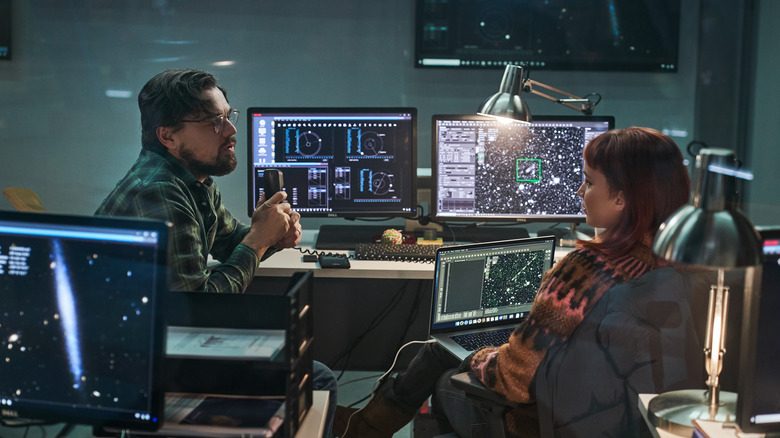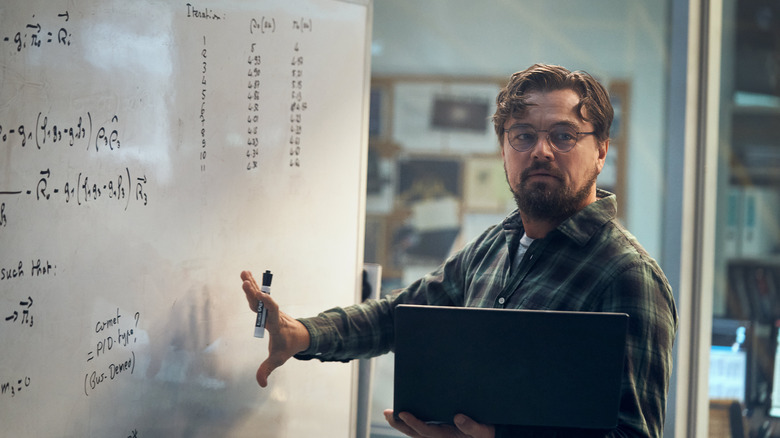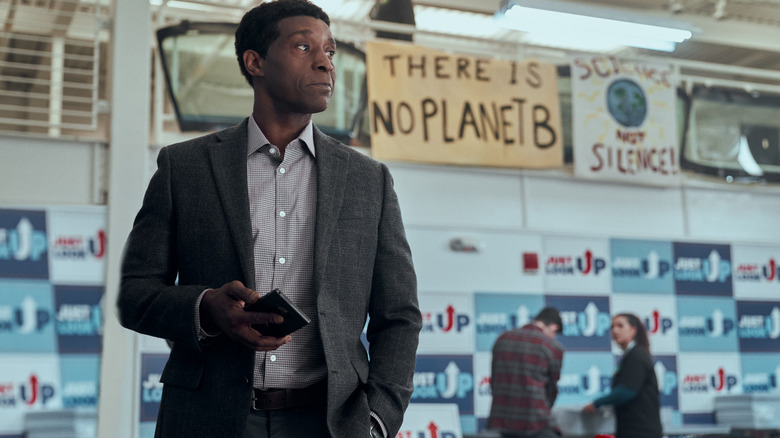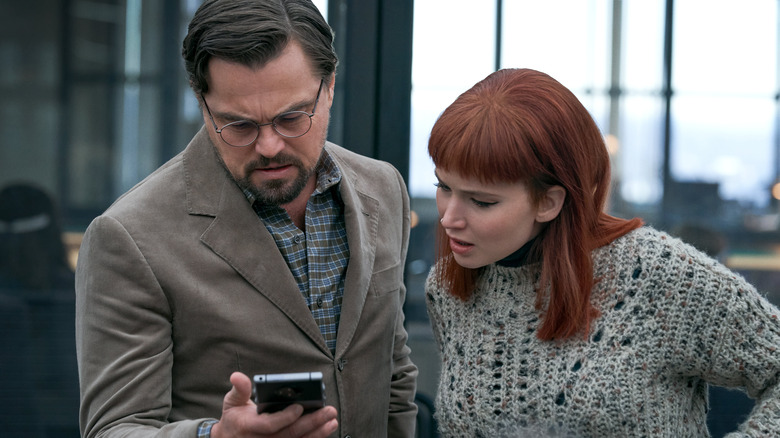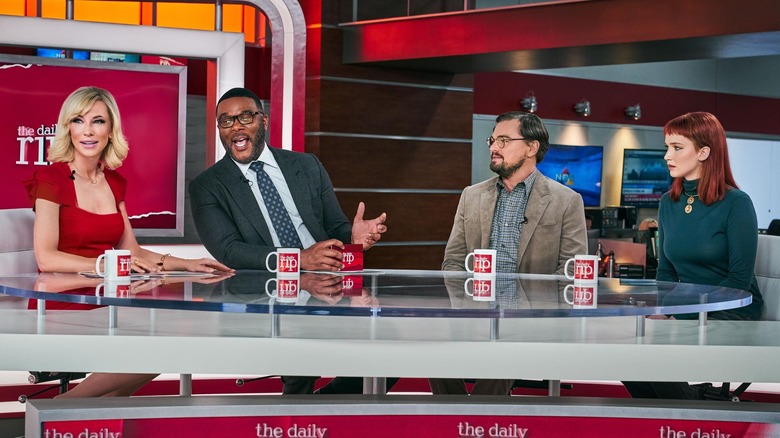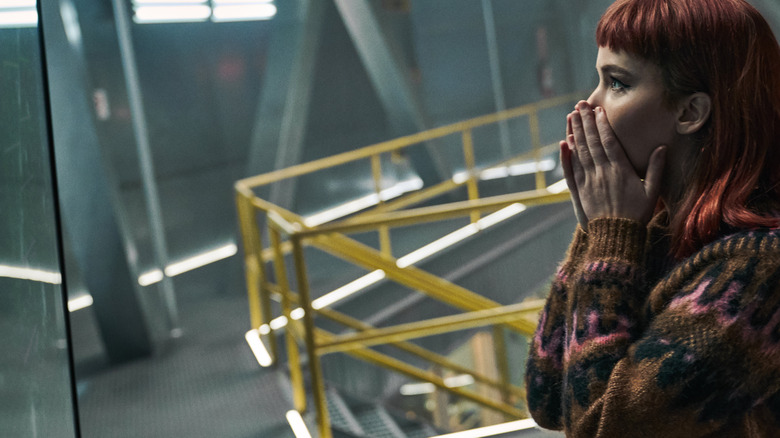Don't Look Up Science Advisor Dr. Amy Mainzer On Bringing Science To Satire [Interview]
We're a long way from 1998, folks. Once upon a time, "Armageddon" represented the nadir of scientific collaboration (or, uh, the lack thereof) in space-set movies when director Michael Bay told Ben Affleck to "Shut the f*** up" after questioning the premise of training oil drillers to become astronauts and blow up an incoming asteroid ... instead of simply training astronauts how to drill a hole on an asteroid. Not that scientific accuracy is the end-all, be-all when it comes to entertainment, of course, but we have since received much more worthwhile efforts in the form of Christopher Nolan's "Interstellar" and its singular fidelity to the behavior and appearance of black holes (anyone who gets that nerdy pun gets a no-prize!); Alfonso Cuarón's "Gravity" and its painstaking recreation of orbital mechanics; the impressively plausible off-world colonization scenarios depicted in Ridley Scott's "The Martian;" and now Adam McKay's doomsday satire, "Don't Look Up."
The early stages of the film depict the discovery of a new comet and the shocking realization of its collision course with Earth in frightening detail. In order to authentically bring these moments to life, McKay turned to NASA's JPL (Jet Propulsion Laboratory) for guidance. Enter Dr. Amy Mainzer, a climate change scientist and NASA astronomer who has spent much of her career tracking exactly the sorts of dangerous Near Earth Objects (NEOs) that ends up threatening the world in "Don't Look Up." Fresh off the film's release in theaters earlier this month and with its Netflix debut set for December 24, 2021, I had the opportunity to speak with Dr. Mainzer about her contributions to the script, her work with actors Leonardo DiCaprio and Jennifer Lawrence, and the importance of making a movie that respects science.
"Fiction has an incredible ability to motivate us to think about the future and to try to envision possible futures."
Do you believe that fiction can renew interest in space among the general public in a tangible way?
Absolutely. Fiction has an incredible ability to motivate us to think about the future and to try to envision possible futures. This movie is very much about envisioning a future that has science denialism front and center at its core. So in other words, this postulates a future where sometimes people don't accept the realities that are being revealed to them through science. I hope this movie inspires people to take a good, hard look at the importance of science in our everyday lives, whether we realize it or not, and try to make science based decisions as they go through life. So I think fiction's extremely important for helping people to really grapple with what science is telling us and try to bring it into practice every day.
And to kind of follow that up, have you encountered this sort of thing firsthand, either yourself or — as a professor — with your students?
Yeah. I've seen so many of my friends and colleagues and myself... We've all had the experience as scientists of people just saying, "No, that can't be right," or, "No, that's not real," or, "I don't believe that," right? But one of the things about science I think that is sort of intrinsically, kind of confusing sometimes for non-scientists is that science is supposed to be self-correcting. In other words, we take new information in and we allow it to sometimes overrule our previous opinions, right, or our previous knowledge. So that self-correcting nature of science is actually a strength. It's a huge strength. In fact, it's the main reason why it all kind of works [laughs] is that we can make corrections based on new information. That's different than just a simple model of just believing something because you decide to believe it, right? So in other words, I think that can sometimes be misinterpreted, the fact that we sometimes accept new information and change our conclusions in science, that that strength can sometimes be misinterpreted as a weakness. I've seen that firsthand myself and I've definitely seen it with my colleagues.
"Science is the way the world works, so we ignore it at our peril."
So obviously ["Don't Look Up"] is a comedy and a satire at the same time, but it's also a far cry from something like "Armageddon," which has oil diggers recruited as astronauts to blow up an asteroid. So was that a priority for you when agreeing to be a science advisor on this film, the fact that the artists behind it had such respect for the science involved?
Yes, that is extremely important to me. As a scientist, I really want to work with people who are also feel the same way about science that I do. They don't have to be a scientist. In fact, it's great if they're not because as artists, they can do things that as a scientist, I simply can't do. It was really important though that this team was very passionate about science themselves, about science education, about the impact of science denialism and how dangerous that is for society. It was really important to me to work with a group of people who feel similarly, who share that passion. And I think they made a movie that is effective in communicating its core message, that [laughs] we really do need to make science based decisions as a society because science is happening whether we like it or not. It doesn't matter what we think. Science is the way the world works, so we ignore it at our peril.
How early in the filmmaking process were you contacted and brought on board? Was the script already written or was it in the early stages?
So I was brought on board in the "before times" [laughs] actually, before the pandemic started. So it's been over two years, I think, at this point now since I first spoke with Adam and saw a very early draft of the script. So I was with him through the whole process of it from then on, saw many drafts of the script. We had a lot of great conversations about just how the plot should go, what are some of the key moments in the film, how do scientists think, how would they react in this situation, what are some of the key things we would like to say as scientists through the voices of the characters in this movie? And so that was a really great experience working with a team: from the VFX folks who are excellent and amazing, to the actors, to, of course, Adam himself, to really try to make a movie that is fundamentally about the process of science. That was really a good experience.
"They're all huge nerds, and I mean that as a very big compliment."
Your consulting work with Leonardo DiCaprio and Jennifer Lawrence specifically, that was mostly conducted over Zoom?
Yeah, actually we did so many Zoom calls. [Laughs] It was a lot of Zoom calls. I mean, just because of the pandemic, right? I mean, just even the process of making a movie during a time when vaccines were not widely available, when even testing was difficult to come by, it was really intense. And they really rose to the challenge of trying to be able to get into the minds of the scientists, especially Jennifer Lawrence and Leonardo DiCaprio and Rob Morgan. The three of them together really represented, in my opinion, they really tried very hard to represent the diversity of scientific thought, just how scientists deal with difficult news and what do we do when we feel like we're not being heard. So I had a great experience working with all three of them. They're all huge nerds, and I mean that as a very big compliment [laughs], so they were great to work with.
Among the many positions you've served throughout your career, you're also currently a professor, so education is obviously something that's important to you. Did that also factor into how you approached your consultation with Adam McKay and the rest of the cast?
Absolutely. Yeah. I mean, science education could not be more important, in my opinion, than it is today. Because it's not necessarily that everybody has to go off and become a scientist. That doesn't have to be the outcome. It's just that the tools of science are so powerful and important for making good decisions in your everyday life, especially as we navigate things like the pandemic, like climate change, extreme weather, all of these things. It is really important that the process of science be something that everybody has as a tool in their toolkit that you can use every day. So to me, trying to educate folks on just how science works and how do we make science-based decisions, that's really something I feel very passionately about. And I feel like we want to work with whatever media that we can to help get the word out about it. Hopefully this movie helps accomplish that a little.
"It's up to us and we can do something about this."
Early on when DiCaprio's character and Lawrence's character are on the phone, it comes up that there's a Planetary Defense Coordination Office. The logo pops up and I'm wondering maybe audiences see that for the first time and then go, "Huh, that is a real thing," and then look that up on their own?
Yeah. So the Planetary Defense Coordination Office is now a real thing. It didn't used to be, but a few years ago, our government actually finally created a Planetary Defense Coordination Office. And it's not that we have to worry about asteroid impacts in our everyday life, but it's something we don't want to completely ignore either. And for a long time this field has been chipping away with just a tiny, little amount of resources. And finally, finally, finally, now the program has started to become what we would need to actually go and map the majority of asteroids that are big enough to really cause serious regional damage. So we're finally getting underway to do that. We've got a new mission that we're going to be launching in 2026 called the Near Earth Object Surveyor Mission. And the objective of that is to help expand our capability to see more of these objects far in the future. But yes, PDCO is a real place. [Laughs] That's a good thing.
You're someone who has specialized in both planetary defense and studying climate change. "Don't Look Up" certainly makes a convincing case that both of these existential threats are thematically linked. Prior to you working on this movie, did you make that connection on your own? Is that what drew you to both of these fields?
It's funny because I am very close to a number of climate scientists and have been for many years. And of course I'm working on asteroids. I recently started working more on some climate change related work, some biodiversity related work, because that's something that's just near and dear to my heart. We've talked about this a lot, just the response of the public to the threat of an asteroid impact versus the imminent threat of climate change. How do you compare and contrast these two? And I think it's important to recognize that in both cases, this is not hopeless. There are definite steps we can take that will mitigate the worst possible outcomes. We just have to kind of go do the work to make sure that those things don't happen. So kind of a central thesis of this movie is that the future really is up to us. It's up to us to decide as a society how well we're going to heed what is being revealed to us through science, and will we take the steps necessary to make sure that things go the best possible way? It's up to us and we can do something about this."
"I thought she knocked it out of the park."
A big part of the problem, and you can even see this with the ongoing pandemic, might be that these issues are a little difficult for the layperson to conceptualize until it's too late, until the comet is visible in the sky, so to speak. So by that time, it might be too little, too late. Would you agree with that?
One of the things that happens in the movie, of course, and I will have to be careful not to spoil it too much, [laughs] but you see scientists are basically being kind of trashed by all these conspiracy theories and special interests that are basically trying to just marginalize them and keep them out of the decision-making process. At the end they're vindicated, but by then at what cost, right? What is the cost for marginalizing science until it's very late in the decision-making process? The movie is a powerful plea for basically ... not doing that. [Laughs] Let's not do that with science, right? Let's bring science to the table. Let's use all of our collective tools in understanding about what is really happening in the physical world, right? The basic physical laws that govern how things work, let's use our knowledge of those to make our decisions about what to do next. That really is up to us.
Jennifer Lawrence has credited you with informing her portrayal of a woman in a largely male-dominated field. Do you see yourself in Kate Dibiasky at all?
Yeah, I mean, it's kind of funny because in my experience, there's a couple of nods to this kind of thing in the film that are quite important that you'll see. There are of instances where her important contributions are neglected essentially, or just somebody just sort of completely assigns credit improperly somewhere else. That obviously happens a lot, to a lot of different people based on many different aspects of identity, not just gender. So it's absolutely something that is a very real problem in the hard sciences. From my perspective, the good thing is that there is a lot of now social science that's actually being brought to bear on the problem to actually bring scientific rigor for how to better improve the situation, so that's great. Obviously I think Jen did a great job in interpreting this character who's undergoing this really difficult situation as a scientist. She brought a lot of humanity to the role, I think, and she did justice to what it's like to be a grad student, [laughs] which is not always very easy. I thought she knocked it out of the park. She did great.
Are there any specific suggestions of yours, in terms of personality or appearance or even dialogue, that did end up in the film?
Yeah, they took many, many of my suggestions. There's a couple key scenes where Leo and Jen's characters are debating the nature of activism. What do you do if you're a person, a scientist, who has learned something that is bad news that requires certain specific steps to avoid the worst possible outcome? And so there's a debate that goes on between what do you do? Do you go outside and protest in the street? Do you try to work within the system, knowing that you're not the person who necessarily has the power to affect change? What is your best role? And so you'll see this debate in the movie about this. And I talked with them extensively about this, that sometimes as scientists, we don't know what the right approach is. Should we just [laughs] be waving protest signs or should we be trying to be in the halls of power, working with people who we sometimes have profound disagreements with about policy? What do we do? And so you'll see that in the movie. I think they did a really good job on that.
"Don't Look Up" is playing in limited theaters now and arrives on Netflix on December 24, 2021.
